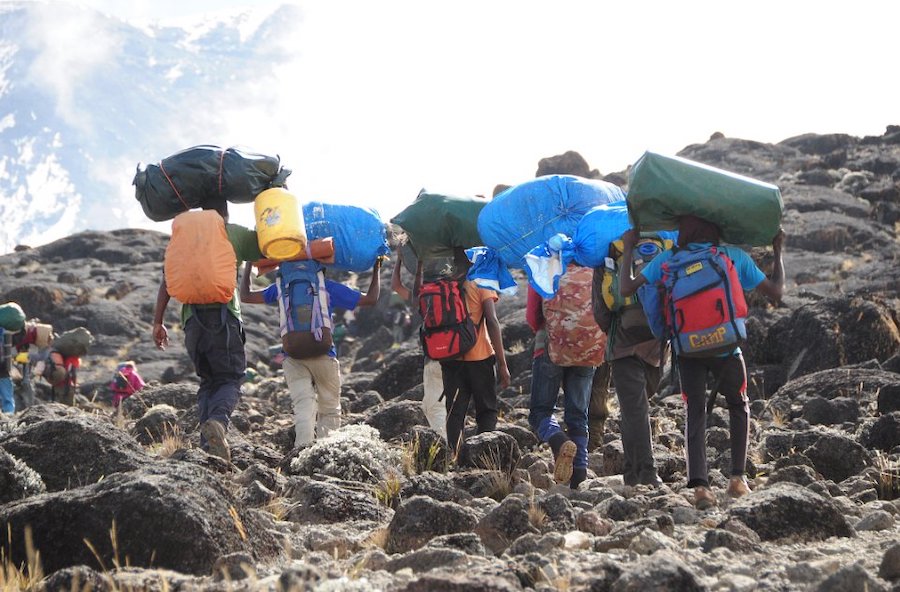Kilimanjaro Porters are an essential part when it comes to climbing Mount Kilimanjaro because you will not be able to get to the summit without the help of the porters, at least not in the estimated time. These Kilimanjaro Porters play an important role in carrying your equipment, tents, and sleeping gear, and after you set off from the camp, they always pack everything up and set up the next camp before you get there so that you are well taken care of when you arrive. They always make sure that you are stress-free throughout your hike, and in case of emergencies, they can help with the rescue, cook, and keep all hikers warm and comfortable.
Kilimanjaro Porters Assistance Project
 The Kilimanjaro Porters Assistance Project was set up to protect the rights of porters on Mount Kilimanjaro and improve their working conditions. KAPA’s main goal is to improve the working conditions of porters by providing both medical and educational facilities, giving or lending warm mountain clothes to all porters for free, advocating for fair wages, demanding fair and ethical treatment, and fighting for porters’ rights.
The Kilimanjaro Porters Assistance Project was set up to protect the rights of porters on Mount Kilimanjaro and improve their working conditions. KAPA’s main goal is to improve the working conditions of porters by providing both medical and educational facilities, giving or lending warm mountain clothes to all porters for free, advocating for fair wages, demanding fair and ethical treatment, and fighting for porters’ rights.
When hiring porters, we ensure that we comply with all the rules and regulations set by the Kilimanjaro Assistance Project (KAPA) to make sure that the porters are well taken care of. We make sure that porters have enough food, adequate housing, proper and good equipment, are paid well, and do not carry excessive luggage.
The weight limit for porters
At Kilimanjaro Climbing we believe in fair porters principle, and abide / practice to the letter the fair porters treatment rules and regulations. Every climber along Mount Kilimanjaro is allocated one or two porters, and it is always up to the climber to make sure that the porter does not carry luggage that exceeds the maximum weight.
We have already established that porters are humans and have rights, and to try and keep them safe. KPAP which we are a member and supporter of has come up with a weight limit for every Kilimanjaro potter, which should not be more than 15 kg (32 lbs.) per porter. The 15 kg does not include the tent, food, and sleeping mat, so as you plan your climb, make sure your duffel bag with the equipment has a 15 kg limit.
Luggage is normally weighed at the starting gate under close and strict supervision of the Kilimanjaro National Park personnel who make sure the rules and regulations are adhered to.
How many porters are needed for a safe Kilimanjaro climb?
To successfully climb Mount Kilimanjaro, one needs an average of about 2 or 3 porters, although the number of porters also depends on the route used and the number of people in a group. Easier hike routes like the Marangu route require few porters (about 2) since they have permanent huts and do not require tents, and for the more difficult routes, you will need about 3 to 4 porters. The larger the group, the fewer porters are needed, and vice versa.
Tipping Kilimanjaro porters
Kilimanjaro porters can be found at the Kilimanjaro National Park gate, especially for budget tour operators. This is the only way that they can provide for their families, and that is why we advise that you tip them well and daily so that they can feed their families. Most tour companies poorly pay their porters, and some do not see their money, meaning they survive on the tips that you give them per day. Below is what you should pay, although you can pay more than that according to KAPA.
Recommended porters tipping guide for the year 2023
| Porters | USD 10 |
| Cook | USD 20 – 25 |
| Assistant guide | USD 15 – 20 |
| Lead / Head guide | USD 15 |
How to climb Kilimanjaro while treating operators fairly?
It is usually up to the tour operator to pay wages to the porters, but they are rarely paid, and this is where you come in. The first thing that you should do is plan accordingly before you travel with the tip money, and when you get to Tanzania, it’s better if you have local currency, gets time to talk to the porters and appreciate them individually, and make sure that you stick to the weight limit set by KAPA.
As a hiker, it is also your responsibility to make sure that the company you are hiring cares about the porters, their well-being, and their rights. Look out for a local tour operator who is supported by KAPA so that you have an enjoyable and safer Kilimanjaro climb.
